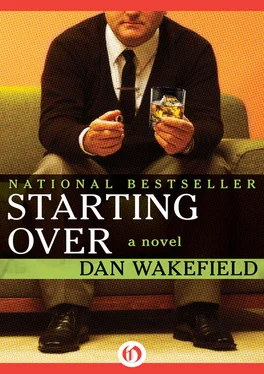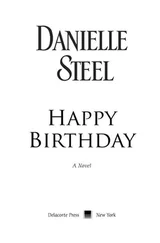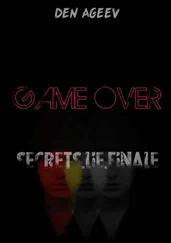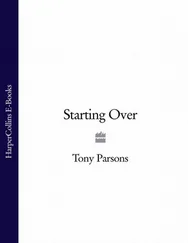“I couldn’t do it to them,” he said. “So I figured maybe I could do the deed on a writer I didn’t love. For the last three years, I’ve been trying to write a proper thesis on Pope.”
“Why Pope?”
“Because I find the bastard dull. Always have. You see, if I’m to grind out a dull exercise I feel I might have a better chance with a subject I think is matching.”
“How’s it coming?”
“Lousy. It’s so dull, I can’t hardly make myself work on it. But I work on it anyway every weekend. Made a little study in the basement, and I go down there regular, like spending time in jail.”
“Jesus. What happens if you don’t finish?”
“Ah, my friend. Then I don’t teach much longer. Not in a college, anyway, not likely.”
Potter damned the injustice of it all, and they had more rounds. On the eighth round, as Potter began to reel, Gafferty glanced at his watch and jumped out of the booth.
“Jesus, man, speakin’ of trouble, I’m an hour late for dinner already. And got me a forty-minute drive yet.”
“Shit, I’m sorry. Listen, blame it on me.”
Gafferty smiled, and said, “Thanks, but it doesn’t work that way. That easy.”
“No, I guess not.”
Potter felt too bloated from the beer to want to eat anything, so he went home and drank Scotch and sodas. Around ten, he opened a can of cashews, for sustenance. He didn’t put on the TV or the phonograph, but sat in a kind of trance, thinking of Gafferty’s plight with academia, and realizing he hadn’t faced up to his own. The present year of teaching was like a joyride, but soon, if he wanted to continue, if he wanted to make it a permanent thing, he would have to face up to working for his own academic union card, his own advanced degree. That would mean going back to school and taking courses, writing papers, eventually grinding out a thesis.
He couldn’t imagine doing it. Nor could he imagine doing anything else. He took the bottle of Scotch to bed with him, sipping on it, like medicine, till he finally blotted out.
The electric buzz of the alarm clock, a steady, insistent, one-note harangue, woke Potter to a clammy grey morning. Thursday. He had no classes, but had to go in for office hours. Student visitation. When the term began he had scheduled his office hours on the days of his classes, M—W—F, because he had to go into Gilpen anyway, and it left the other days completely free. But when he discovered this “freedom” led to late, troubled sleep and a yawning vacuum, he changed his office hours to the “Free” days, which meant that he had to get up and dress and go out into the world. Even if no one came he had to be there, sitting in his office.
It was on the fifth and top floor of the walk-up building, a floor that had once been used for storage but had been remodeled into makeshift offices. They were furnished with anonymous grey metal desks and khaki metal bookcases that you put together with screws. Potter had Scotch-taped a poster of Humphrey Bogart on the wall. It was the best he could figure out, for decoration. The lower left-hand corner of it had come unstuck, and curled upward. Potter meant to tape it down again.
He took up a styrofoam cup full of hot black coffee from the cafeteria, and set it on his desk. From the bottom right-hand drawer, he drew out a pint of Cutty Sark, and splashed some into the coffee. He took a few sips and then went to the bookcase. Only two shelves had books, and they were mostly texts—ones that were used in his courses, or ones that publishers sent in hopes of having some teacher put them into their curriculum. Book salesmen “called,” like guys who sold aluminum siding for houses door-to-door.
Potter pulled out one of the freebie texts that a salesman had left. It was called A Drama Casebook . He opened it, and the smell of fresh paper struck his nose like a perfume. He flipped through the book, seeing fairly soon it was composed only of the shreds of plays, with long, accompanying “exercises,” tests and questions and “study proposals.” Most of the textbooks were like that. Collections of snippets of real things, and made-up crap strung after them like tin cans tied to a dog’s tail.
Potter closed the book, and slipped a little more Scotch into his coffee.
Traffic quarrelled below on Beacon Street, slowed by rain and fog. Potter went to the window and swiped a clearing of moisture he could see through. To other town-house buildings across the street. He sat back down, wishing to hell a student would come. Any student. No, perferably a girl. Not for any sexual fantasy, just for comfort. There was some kind of comfort that Potter could feel in the presence of a woman, a girl, that not even his best male friends could give him. No doubt it was some other goddamn aspect of Male Chauvinism. He’d never admit it to the militant Lib girl in his PR seminar. He would swear to her it was all the goddamn same to him; otherwise she’d have his balls.
There was a rap on his half-open door, and Potter said brusquely, “Yes, come in.”
He couldn’t help smiling, with pleasure and relief. It was Rosemary Korsky.
“You busy?” she asked.
“Absolutely sunk in work, tied up with phone calls from New York and Washington, students bugging me and a couple of big producers pleading to get my opinion on their new shows. However . Miss Korsky, for you, I will gladly put it all aside.”
“Yeah?”
She grinned and sat down.
Potter started to take a sip of his doctored coffee, but instead pushed the cup aside. Miss Korsky gave him enough of a glow.
He wasn’t even quite sure why.
She was attractive, but certainly no great beauty. Dyed light-blonde hair with the darker roots showing where it parted in the middle. Not even long, it just came down to her neck and then curled back upward, like Doris Day. She wore too much makeup, partly no doubt because of what seemed a semi-bad skin. A nicely proportioned body, but nothing to send to Atlantic City. She dressed nicely, wearing mostly sweaters and long skirts and boots, nothing flashy or ostentatious for this flair-conscious time. Nor was it her brilliance or even any interesting, offbeat turn of mind that caught Potter’s imagination. She was a solid B student who answered test questions with methodical, information-filled persistence, done in a clear, well-trained hand that was easily readable.
And yet, she was one of the students to whom Potter realized he was talking when he lectured. When, one Wednesday during the third week of classes she was absent for the first time, Potter was rattled and grouchy, and let the students free twenty minutes early.
“Crummy day,” Miss Korsky said.
She plunked her lapful of books on the cold cement floor and wriggled out of her coat, letting it fall on the back of her chair. She was wearing a plain maroon sweater with short sleeves, and she rubbed her hands vigorously up and down her forearms.
“Ah,” Potter sighed. “Miss Korsky.”
“What?”
“Nothing.”
He smiled. “What can I do for you?”
Miss Korsky activated a wad of chewing gum that had evidently been put to rest temporarily behind a molar, and slowly, contemplatively, began to mash it around in her mouth.
“Oh, I was wondering, sort of. About this paper you want us to write.”
“The thing on Symbolism?”
“Well, that—” She turned to the rain-streaked window.
“Yes?”
“And—”
“Yes?”
Her brown eyes looked straight into him and her mouth made a partial smile that expressed a kind of sorrow, and an unfeigned weariness that is not usually associated with young people, not because it isn’t common among them but because their elders would rather not see it there.
“I guess I just didn’t want to go out into that yet. Outside.”
Читать дальше












